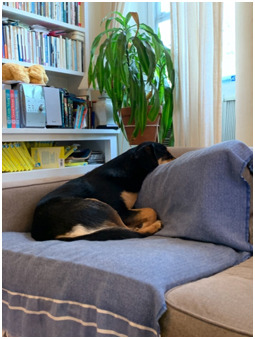
Serendipity and Research: In Praise of Fellowship
I was asked to contribute something about how the pandemic has affected my fellowship life and associated research. But I want to make this a little more personal and add a thought about why I think that a fellowship is such an important way to create the conditions for professional interactions that are not immediately purpose driven. Without such interactions, I believe, the scholarship produced would be much impoverished. It is only from my current confinement that I fully realize the value of sharing a physical space with a community of researchers. During my fellowship I myself learned so much that I could not have sought out all by myself. Some of that now helps me think about my work in new ways. What I want to also say, then, is a word of “thank you!” to everyone who made this possible. Inevitably, that will be from my own perspective. But I am sure that everyone who is part of a fellowship program will have similar experiences. That’s why this is written to fellowship.
When I left Istanbul in March to present at a conference in Canada, COVID-19 was already on the news, but few were foreseeing the extent to which the pandemic was going to affect people’s lives all over the world. I got stranded in New York. Within a week of my arrival the city had turned into one of the major epicenters of the pandemic. It’s been two and a half months of staying in a Brooklyn house with my partner, only going out of doors to walk our dog Billie. And it’s been eerie.
As of now there are more recorded deaths from COVID-19 in Brooklyn alone than in all of Turkey combined. For a period of time in April, on average, every three minutes a New Yorker died from the novel coronavirus. My thoughts are with all those whose lives and livelihoods are affected by this health crisis. To me the strangest thing about these past months was the complete disconnect between my lived experience and the events as they unfolded in the outside world. These events were accessible to me only through numbers, images, and letters on a screen. Were it not for the constant sound of sirens, the seven o’clock cheering for healthcare workers, and the rare trips to the grocery store with mask and gloves, it could all have been in a parallel universe. To me, it kept feeling like an eternity in which nothing was happening and so much was changing. This feeling of disconnect was such that one day I put on protective gear and cycled to Manhattan, just to see whether she was still there. The buildings were, but the place I knew wasn’t.
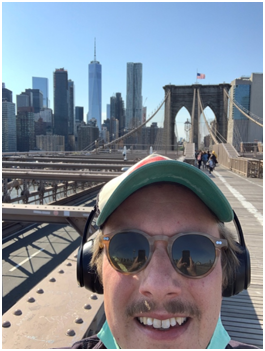
Manhattan still there (own photo). For some powerful NYC lockdown photography, see https://www.instagram.com/newyorknico/?hl=en
Stranger still has been perhaps the feeling that while so many people were suffering around me, I was making good progress with my work. Even if not affected by the virus directly, tens of millions of Americans have lost their jobs, some of them friends. But in contrast to jobs in hospitality, for example, a researcher’s job can to a large extent be done in isolation. In fact, the crisis has shown us that the lion’s share of an academic job, be it studying, teaching, or producing scholarship, can pretty successfully be done remotely. As universities have transitioned to remote teaching across the country, with many of them carrying on with online instruction in the fall semester, the question arises: what is really lost by not being physically present on campus? For many incoming students it might be the “college experience,” an idea of education broader than the processing of new information.
But beyond that, I think something crucial to scholarship itself is lost when scholars are not living and working in the same physical space. If you have been working from quarantine, you might be able to relate to this: interaction online, be it with colleagues, advisors, or advisees, live or written, tends to be purpose driven. You tend to have in mind, already before the interaction, an objective, and it is because of that objective that you have such interaction in the first place. Such purpose-driven interaction is of course common offline, too—going to someone’s office-hours, for example. But in front of a screen, it seems to me, that’s pretty much all there is. You set out from what you already know on a quest for a specific piece of information. But you cannot look for an answer to a question that you cannot conceive of in the first place.
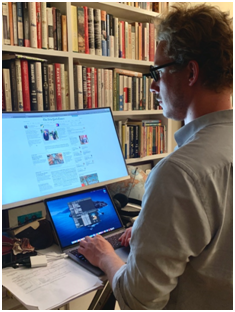
Confinement of the screen (own photo)
Finding an answer to something you weren’t looking for, or for which you didn’t even know there was a question to begin with, is what I mean by serendipity in scholarship. And that naturally tends to happen in the kinds of interactions that are not purpose driven from the start. Such interactions don’t occur in scheduled calls; they tend to occur when you are precisely not looking for specific kinds of information. Fellowship programs like ANAMED’s contribute to scholarship not only by providing the material circumstances for scholars to carry out and share their work but also by creating the conditions in which scholarly serendipity is possible.
Sadly, the pandemic effectively ended my stay at ANAMED prematurely. Many of the other fellows have returned to their homes, too. It is from the confinement of my screen that I realize how much is lost, not only on the personal level but also in terms of the serendipitous finds that either have already influenced my research, or might do so in some way or another in the future. That is why I want to thank everyone who made it possible for me to encounter things I didn’t look for. Let that stand for the numerous similar experiences I am sure many fellows have had—and thus for the power of fellowship.
Without the chance encounter with Professor Borbone, on whose side of the table at the Georgian restaurant Galaktion I sat at a fellows’ dinner, I would not have known about annotations to a Syriac manuscript in Bar Hebraeus’s hand, nor would I have gone to the small Hacı Selim Ağa Yazma Eser Kütüphanesi in Üsküdar, where I found a bunch of medieval Arabic manuscripts on logic that I had not seen described anywhere before. Thank you, Professor Borbone, and thank you, Rachel, for organizing this dinner. And Alex, for bringing Professor Borbone in straight from Almaty, for introducing me, and for scouting out the tiny reading room of the Hacı Selim Ağa library with me; and so much more.
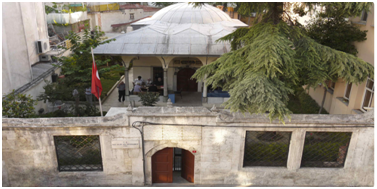
Hacı Selim Ağa Yazma Eser Kütüphanesi in Üsküdar (photo from http://www.haciselimaga.yek.gov.tr)
Without the late-night fancy that brought us into the archaeological lab at ANAMED, I would not know how archaeobotanists and zooarchaeologists figure out astonishing things about the lives and habits of Neolithic communities by studying bones and plant residues from archaeological sites. Thank you, Müge, for showing us your assortments of grains and bones and for explaining to us the work you and Hannah are doing. And of course, for taking Alvise and me to Burgazada.
Without the lively and often hilarious stories and images that Henry, Jeff, and Alex brought back from their research trips, “Tur Abdin” would be but a name for me. Thank you all for bringing to life and helping me imagine the landscape and monastic culture of an area I knew nothing about but that is so important for understanding the translation movement from Greek to Syriac and Arabic. I still hope I can go with you one day.
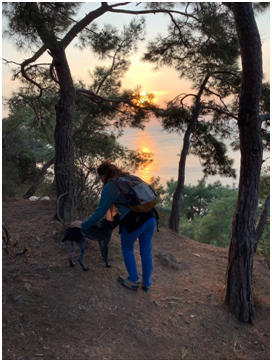
With Müge and Alvise on Burgazada (own photo)
These are but a few instances where I felt I was shown something that I would not have purposefully looked for and that had a direct impact on some of the things I am thinking about in my own research. I could go on, of course, to thank Athena, Rinse, Emre, Alvise, Güldem, Emine, Bianca, and Nergis Hoca for showing me so much I didn’t know about archaeological questions, methods, and sites. For example, I did not know what landscape archaeology was. (And to Nergis Hoca for impromptu Turkish lessons; aşkımız çıkmaz sokak, or what was it?) Thank you to the Ottomanists (if I may group you thus) Betül, Hakan, Gülşah, Faiz, and Ellen—and to Rachel for taking me out for dinner with Leslie Pierce—for teaching me much about the Ottoman Empire and sparking my interest in further reading on different aspects.
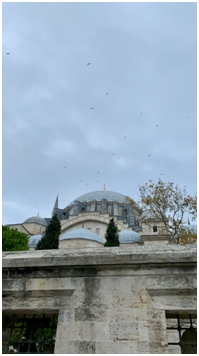
From my first trip to Süleymaniye with Ibrahim (own photo)
Thank you to Catie and Ömür for making me think about identity studies, the Anthropocene, and heritage, all of which I was skeptical about, but to which I gained access thanks to your work. Ibrahim, thank you for introducing me to Süleymaniye, for talking about manuscripts and Sufism, and for taking me to a conference at the Swedish Institute where I learned much. Thank you, Rachel, for giving me an insight into diglossia in Armenian manuscript culture, and so much more. Thank you, Mark, Milan, and Giovanni for filling in my patchy knowledge of the Byzantine world with homilies, literary (self-) characterizations, and art. Thank you, Hüseyin, for reminding me of my fascination with epigraphy. Thank you, Athanasios, for showing me how the serious and meticulous history about the petty aristocracy can be so exciting.
Writing from the confinement of my screen where little spontaneity is possible, I am grateful for the time we all spent together as fellows in Merkez Han and all the unexpected finds you made me stumble upon. For many of you, I still have questions. I wanted to talk with you, Faiz, about writing history books, because I found your prose so gripping. And I wanted to talk with you, Chris, about your book on Lydia, of which I read some parts. Maybe chance will have it that we will do that in the future. For now, I want to thank you all, and of course especially, Duygu and Chris, Mukaddes, and the entire staff of ANAMED who helped create this atmosphere of fellowship. As the academic world might see some more or less momentous changes in the aftermath of this pandemic, I hope that researchers, administrators, and funding bodies don’t overlook to what extent research is fueled by the possibility of serendipity that fellowships like ANAMED’s are so well prepared to provide.
—Dustin Klinger, PhD Fellow, 27 May 2020

